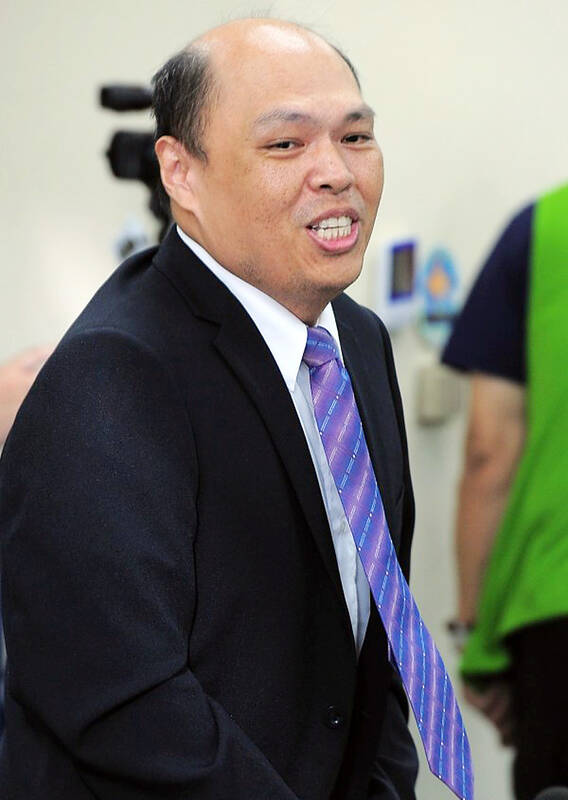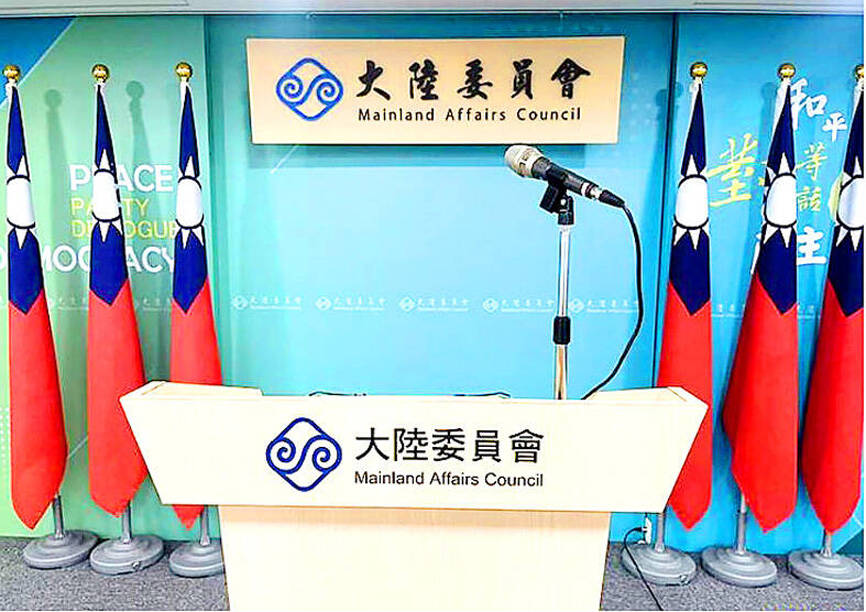A former Chinese Nationalist Party (KMT) mainland affairs director is to be investigated by the Mainland Affairs Council for allegedly claiming to represent Taiwanese when attending a symposium in China earlier this month that observed the 20th anniversary of the implementation of China’s “Anti-Secession” Law at which he said that the law is “the best medicine for unification,” an official familiar with the matter said yesterday.
The council would investigate if Huang Ching-hsien (黃清賢) contravened the Act Governing Relations Between the People of the Taiwan Area and the Mainland Area (臺灣地區與大陸地區人民關係條例) by colluding with high-ranking members of the Chinese Communist Party (CCP), as well as Chinese military and government officials.
The highest-ranking Chinese official at the symposium held in the Great Hall of the People in Beijing on March 14 was National People’s Congress of China Chairman Zhao Leji (趙樂際). Chinese Minister of Foreign Affairs Wang Yi (王毅), United Front Work Department head Shi Taifeng (石泰峰), Minister of Public Security Wang Xiaohong (王小洪), Chief of Staff of the Joint Staff Department of the Central Military Commission Liu Zhenli (劉振立), Commander of the Eastern Theater Command of the People’s Liberation Army Lin Xiangyang (林向陽) and other officials also attended.

Photo: Taipei Times
Huang, who serves as director of the Taiwan Political Research Center at Nankai University in Tianjin, China, said that Taiwan’s “unification with the motherland” would be best achieved through peaceful means, which is in line with the fundamental rights and interests of compatriots on both sides of the Taiwan Strait.
The “Anti-Secession” Law combats “Taiwanese independence separatists” and would curb their impulses for independence, he said, adding that it authorizes the Chinese government to use non-peaceful means and other measures to prevent secession.
The authorities in Taiwan should consider the rights and welfare of the public and not misjudge the situation, he added.

Photo: Taipei Times
Huang claimed to represent Taiwan at the event that was designed to intimidate Taiwanese, and what he said was used by the CCP as propaganda, the official said.
Huang might have contravened Article 33-1 of the act, which bans people, organizations or other institutions from engaging in any form of cooperative activity with agencies, institutions or organizations in China which are attached to the CCP or the military, or which are involved in political work against Taiwan or affect national security or Taiwan’s interests, the official said.
Huang would be asked to return to Taiwan to explain himself, the official said.
The government would definitely enforce cross-strait regulations since Huang went to the event to support the CCP, the official said.
If Huang has a household registration in China, his Taiwanese ID card would be revoked and he would be asked to leave the country, the official said.

Intelligence agents have recorded 510,000 instances of “controversial information” being spread online by the Chinese Communist Party (CCP) so far this year, the National Security Bureau (NSB) said in a report yesterday, as it warned of artificial intelligence (AI) being employed to generate destabilizing misinformation. The bureau submitted a written report to the Legislative Yuan in preparation for National Security Bureau Director-General Tsai Ming-yen’s (蔡明彥) appearance before the Foreign Affairs and National Defense Committee today. The CCP has been using cognitive warfare to divide Taiwanese society by commenting on controversial issues such as Taiwan Semiconductor Manufacturing Co’s (TSMC, 台積電) investments in the

INVESTIGATION: The case is the latest instance of a DPP figure being implicated in an espionage network accused of allegedly leaking information to Chinese intelligence Democratic Progressive Party (DPP) member Ho Jen-chieh (何仁傑) was detained and held incommunicado yesterday on suspicion of spying for China during his tenure as assistant to then-minister of foreign affairs Joseph Wu (吳釗燮). The Taipei District Prosecutors’ Office said Ho was implicated during its investigation into alleged spying activities by former Presidential Office consultant Wu Shang-yu (吳尚雨). Prosecutors said there is reason to believe Ho breached the National Security Act (國家安全法) by leaking classified Ministry of Foreign Affairs information to Chinese intelligence. Following interrogation, prosecutors petitioned the Taipei District Court to detain Ho, citing concerns over potential collusion or tampering of evidence. The

‘COMPREHENSIVE PLAN’: Lin Chia-lung said that the government was ready to talk about a variety of issues, including investment in and purchases from the US The National Stabilization Fund (NSF) yesterday announced that it would step in to staunch stock market losses for the ninth time in the nation’s history. An NSF board meeting, originally scheduled for Monday next week, was moved to yesterday after stocks plummeted in the wake of US President Donald Trump’s announcement of 32 percent tariffs on Taiwan on Wednesday last week. Board members voted to support the stock market with the NT$500 billion (US$15.15 billion) fund, with injections of funds to begin as soon as today. The NSF in 2000 injected NT$120 billion to stabilize stocks, the most ever. The lowest amount it

NEGOTIATIONS: Taiwan has good relations with Washington and the outlook for the negotiations looks promising, Minister of Economic Affairs J.W. Kuo said Taiwan’s GDP growth this year is expected to decrease by 0.43 to 1.61 percentage points due to the effects of US tariffs, National Development Council (NDC) Minister Paul Liu (劉鏡清) said at a meeting of the legislature’s Economics Committee in Taipei yesterday, citing a preliminary estimate by a private research institution. Taiwan’s economy would be significantly affected by the 32 percent “reciprocal” tariffs slapped by the US, which took effect yesterday, Liu said, adding that GDP growth could fall below 3 percent and potentially even dip below 2 percent to 1.53 percent this year. The council has commissioned another institution